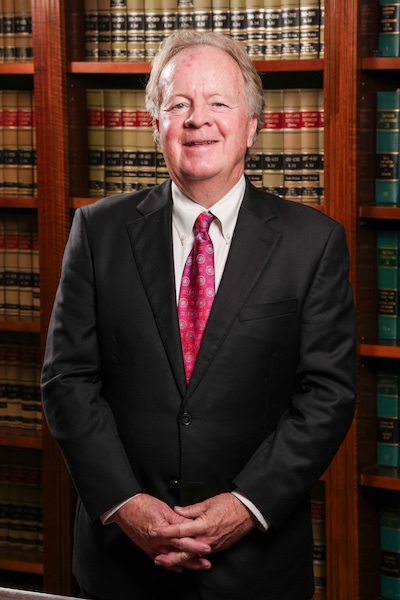One by-product of being a trial lawyer in proximity to a major university is that at some point in time, you are inevitably asked about handling Title lX sexual misconduct cases.
To be clear at the outset, Title lX is an abbreviated description of a 1972 amendment to the 1964 Civil Rights Act, which works to prohibit sexual discrimination against employees and students at universities, colleges and educational institutions. The law protects women, men and (in theory) transgender individuals.
The actual language is: " No person in the United States shall, on the basis of sex, be excluded from participation in, or denied the benefits of, or be subjected to discrimination under any educational program or activity receiving federal assistance."
Initially this served to level the playing field in inter-collegiate athletics where men had received the overwhelming bulk of economic support but in time Title lX served many useful purposes to reduce gender-based employment discrimination and sexual assaults and misconduct.
Educational institutions were given wide latitude in structuring programs to implement Title lX and to evaluate student misconduct. In time a variety of models arose with varying degrees of due process for the participants. In 2011 a "Dear Colleague Letter" emanated from the Obama administration Office of Civil Rights and a legal firestorm was ignited that burns with great intensity today.
That "letter" ordained that educational institutions pursue a set of institutional practices that seem antithetical to constitutionally mandated protections secured by, among other things, the Bill of Rights. The changes mandated included an accelerated time table for resolution of such claims (Sixty days), a right of appeal for accusers when the Title lX investigation went against them, the effective elimination of cross examination of the accuser and finally and most significantly, the requirement that the standard of proof of such claims be by a preponderance of the evidence.
This latter development meant that individuals wrongfully accused suddenly faced a huge change from the previous standard of proof by "clear and convincing evidence". Preponderance of the evidence means more likely so than not so or as lawyers formulate it routinely in court, 51% likely. This of course suddenly meant that she said, he said cases, without any extrinsic evidence were resolved in the complainant's favor with expulsion from school as the remedy.
In an era when a college degree is seen as a minimum requirement for employability, a lifetime of academic effort is necessary to attend college and the cost of attendance is staggering, this can all be wiped away in a blink of an eye. One's "permanent record" also reflects a finding of a "sexual misconduct" expulsion. Good luck finding another institution to alow you to complete your degree or an employer who wants to take on a sexual harasser or worse.
There is also the matter of the tremendous amount of time, effort and money expended to the point of the accusations. Having represented a graduating senior who was expelled on an exceptionally thin case, one can see how literally hundreds of thousands of dollars are at stake with minimal due process in place.
The net effect was to increase findings of "responsibility" for those accused and to eliminate any true ability to respond to spurious claims. Many universities including most significantly the University of Maryland College Park, put into place systems that removed the possibility that an "accused" could effectively receive legal representation while simultaneously employing the "single investigator" model.
What this meant is that a single Title lX investigator amasses the "evidence" that they regarded as relevant, embodies this "evidence" in a report that is then submitted to The Office of Student Conduct and its director.
In an effort to simplify this discussion, where expulsion is the routine sanction, a "disciplinary conference" is held (not a hearing or actual constitutional rights might attach) and the investigator's conclusions are invariably adopted with expulsion inevitable. The accused isn't ever allowed to question the witnesses against him and should they have the temerity to hire a lawyer, the lawyer must stand mute at this kangaroo court proceeding.
If this last paragraph seems angry it is because there simply are no checks and balances on the "investigator" and it appears that universities are being incentivized to attain findings of "responsibility" and thus expulsion.
If, hypothetically, an investigator brought individual prejudices to the table there literally is no way to combat or expose them. The investigator determines what is relevant or credible and becomes judge, jury and executioner. In a recent case the investigator was made aware of exculpatory witnesses for the accused and purportedly attempted to contact them. The witnesses provided sworn affidavits concerning both their exculpatory evidence and the abject failure of the investigator to contact them.
Of course there was no mechanism for bringing this before the disciplinary conference (remember no lawyers and no cross examination of anybody) and the only witness at the "conference" was (you guessed it) "the Investigator to summarize the Investigation and explain the evidence relevant to the alleged Prohibited Conduct in violation of the Policy." (see APPENDIX A: STUDENT SEXUAL MISCONDUCT COMPLAINT PROCEDURES )
So in a well intended effort to combat sexual assault and misconduct, the Obama administration weaponized Title lX by effectively eliminating most of the due process protections enjoyed by everyone else in our society. If someone is unhappy with their boyfriend or girlfriend just accuse them of sexual assault or misconduct and the odds are pretty good that the ex-boy or girlfriend will have their life ruined.
Fortunately the court system is finally recognizing the enormous problems wrought by the "Dear Colleague Letter", the "single investigator system" and the deprivation of due process protections. The Sixth Circuit U.S. Court of Appeals has issued two major opinions citing systemic problems at the University of Cincinnati and the University of Michigan and overturning sanctions imposed on Title lX respondents.
Meanwhile, the Trump administration has issued new guidelines providing for actual mechanisms for cross examination and a likely return to proof by clear and convincing evidence. Whether these actions in conjunction with court sculpted remedies create a fairer environment remains to be seen.
A Supreme Court opinion concerning this highly flammable topic seems inevitable and our hope is that a successful balance can be found that reduces sexual assault and misconduct while protecting the vital constitutional rights of our citizenry.

